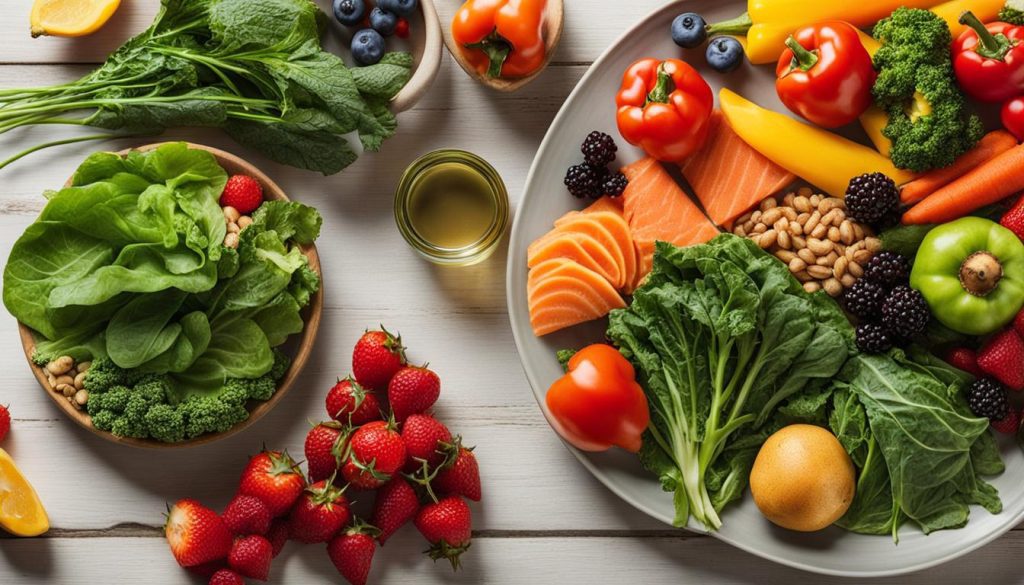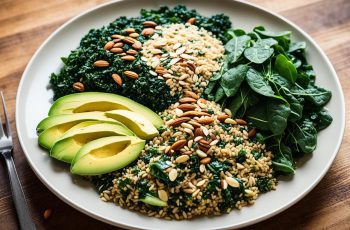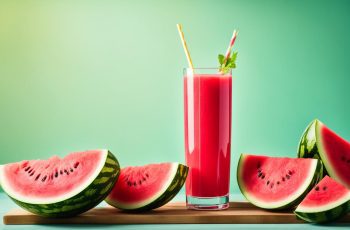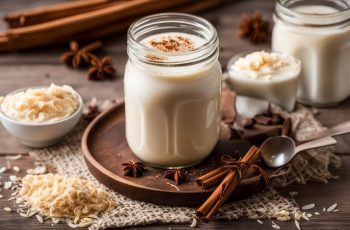As women age, their nutritional needs undergo significant changes. It’s important for women to pay attention to their diet, ensuring they are getting the essential nutrients to support their health and well-being in their golden years. Proper nutrition can help mitigate the risk of age-related health issues and promote healthy aging. Let’s explore the key nutrients that are crucial for women as they age.
Key Nutrients Women Need As They Age
- Meeting the nutritional requirements is essential for women’s health as they age.
- Women should focus on consuming nutrient-rich foods to support future health and reduce the risk of age-related health issues.
- Specific nutrients like iron, vitamin B6, magnesium, folate, choline, vitamin B12, zinc, calcium, vitamin D, and iodine are particularly important for women.
- Nutritional needs change at different life stages, and it’s crucial to prioritize key nutrients like protein, fiber, B12, magnesium, and water intake for optimal health and well-being.
- Following a balanced diet, incorporating specific diets, and considering supplements can help women meet their nutritional needs.
Nutritional Recommendations for Females by Age
When it comes to women’s health and nutritional needs, it’s important to consider the key nutrients for healthy aging. As women grow older, their bodies require specific nutrients to support optimal health and well-being. The recommended nutrition per day varies based on age and individual nutritional needs.
On average, women should consume about 2,000 calories daily to maintain their weight and 1,500 calories to lose 1 pound per week. However, it’s important to note that these numbers can vary depending on factors such as metabolism, activity level, and overall health.
Compared to males, females have different nutritional requirements, particularly in certain nutrients. Some of the key nutrients that women should pay attention to as they age include:
- Iron: Important for ensuring proper oxygen transport throughout the body and preventing iron-deficiency anemia.
- Vitamin B6: Plays a key role in brain development and function, as well as the production of hormones and neurotransmitters.
- Magnesium: Essential for maintaining healthy bones, regulating blood sugar levels, and supporting muscle and nerve function.
- Folate: Particularly important for women of childbearing age, as it helps prevent neural tube defects in newborns.
- Choline: A vital nutrient that supports brain health, liver function, and fetal development during pregnancy.
- Vitamin B12: Essential for the production of red blood cells and maintaining healthy nerve cells.
- Zinc: Necessary for a healthy immune system, wound healing, and DNA synthesis.
- Calcium: Vital for maintaining strong bones and teeth, as well as supporting muscle function and nerve transmission.
- Vitamin D: Important for bone health, immune function, and the absorption of calcium.
- Iodine: Essential for the production of thyroid hormones, which regulate metabolism and support brain development.
The specific amounts of these nutrients can vary depending on age, health conditions, and level of physical activity. It’s advisable for women to consult with a healthcare professional or registered dietitian to determine the appropriate nutrient intake for their specific needs.
Nutritional Requirements during Different Life Stages
Throughout a woman’s life, her nutritional needs change at different life stages. It is important to pay attention to these changing needs and adjust our diets accordingly to ensure optimal health and well-being. Let’s explore the dietary needs for women in their golden years, the best nutrients for women’s longevity, and the key minerals for aging women.
Adolescence
During adolescence, girls require adequate amounts of protein for proper growth and development. Protein is essential for building and repairing tissues, producing hormones, and supporting a healthy immune system. Good sources of protein include lean meats, fish, eggs, dairy products, legumes, and nuts.
20s and 30s
In their 20s and 30s, women should focus on consuming folate, iron, and calcium to support pregnancy and maintain overall health. Folate is important for preventing birth defects and is found in foods such as leafy green vegetables, citrus fruits, and fortified grains. Iron is crucial for preventing iron deficiency anemia and can be obtained from sources like lean meats, fortified cereals, and legumes. Calcium is essential for strong bones and teeth and can be found in dairy products, fortified non-dairy milks, and leafy green vegetables.
40s and 50s
As women enter their 40s and 50s, vitamins C and D, omega-3 fatty acids, and flavonoids become more important for hormonal balance and prevention of age-related health issues. Vitamin C is a powerful antioxidant that supports the immune system and is found in citrus fruits, berries, and peppers.
Vitamin D helps the body absorb calcium and is synthesized through sunlight exposure; it can also be obtained from fatty fish, fortified dairy products, and supplements. Omega-3 fatty acids, found in fatty fish, nuts, and seeds, help reduce inflammation and support heart health. Flavonoids, found in colorful fruits and vegetables, have antioxidant and anti-inflammatory properties.
60s and Beyond
As women enter their 60s and beyond, it is crucial to prioritize certain nutrients for optimal health and well-being. Protein is important for maintaining muscle mass and strength, and can be obtained from lean meats, fish, eggs, dairy products, legumes, and nuts. Fiber is essential for digestive health and can be found in whole grains, fruits, vegetables, and legumes.
Vitamin B12, found in animal products, fortified cereals, and nutritional yeast, is necessary for proper nerve function. Magnesium, found in leafy green vegetables, nuts, seeds, and whole grains, is important for bone health and muscle function. Lastly, staying well-hydrated by drinking plenty of water is crucial for overall health.
By understanding the dietary needs for women in their golden years and prioritizing the best nutrients for women’s longevity, we can support our health and well-being as we age gracefully. It’s important to remember that individual needs may vary, and consulting with a healthcare professional or registered dietitian can provide personalized guidance for optimal nutrition during different life stages.

Meeting Nutritional Recommendations
As women age, it becomes increasingly important to prioritize their nutritional needs to support their health and well-being. Maintaining optimal nutrition is key to aging gracefully and preserving women’s health.
To ensure adequate nutrition, it is recommended for women to follow a balanced diet that includes a variety of nutrient-rich foods. This includes:
- Fruits and vegetables: These should make up half of your plate. They provide essential vitamins, minerals, and fiber that support overall health.
- Whole grains: Incorporate whole grain products like brown rice, quinoa, and whole wheat bread to provide sustained energy and important nutrients.
- Legumes: Beans, lentils, and chickpeas are excellent sources of plant-based protein, fiber, and important vitamins and minerals.
- Nuts: Almonds, walnuts, and other nuts provide healthy fats, protein, and antioxidants. They help reduce the risk of heart disease and support brain health.
- Lean proteins: Choose lean meats, poultry, fish, or plant-based protein sources like tofu or tempeh to meet your protein needs without excessive saturated fat and cholesterol.
It’s also crucial to pay attention to portion sizes to maintain a healthy weight. By filling half of your plate with vegetables and fruits, and dividing the remaining space between whole grains and proteins, you can achieve a well-balanced meal.
While these recommendations serve as a general guideline, individual nutritional needs may vary. Consulting with a doctor or registered dietitian can provide personalized dietary guidance tailored to your specific health conditions, stage of life, and any pregnancy or nursing requirements.
By making informed choices and adopting a balanced, nutrient-rich diet, women can maintain optimal nutrition as they age and support their overall health and well-being.
Incorporating Diets and Supplements
As women enter their golden years, it becomes increasingly important to focus on the best foods and dietary needs to support their health and well-being. Incorporating specific diets and supplements can provide the necessary nutrients for aging women and help them maintain optimal health.
Following Specific Diets
One way to ensure women get the right nutrients as they get older is by following specific diets that prioritize their unique needs. Diets such as the Mediterranean diet, DASH (Dietary Approaches to Stop Hypertension) diet, MIND (Mediterranean-DASH Diet Intervention for Neurodegenerative Delay) diet, or the Mayo Clinic Diet are all excellent choices. These diets naturally incorporate a variety of healthy foods that are rich in essential nutrients for women’s aging bodies.
For example, the Mediterranean diet emphasizes fruits, vegetables, whole grains, legumes, nuts, and healthy fats like olive oil and avocados. This diet provides a wide range of vitamins, minerals, antioxidants, and omega-3 fatty acids that are beneficial for aging women.
The DASH diet, on the other hand, focuses on low-sodium, high-fiber foods like fruits, vegetables, whole grains, lean proteins, and low-fat dairy products. It is specifically designed to lower blood pressure, reduce the risk of heart disease, and improve overall health. The MIND diet combines elements of the Mediterranean and DASH diets and focuses on foods that are particularly good for brain health, such as berries, leafy greens, nuts, and olive oil.
Finally, the Mayo Clinic Diet is a comprehensive weight-loss and healthy-lifestyle program that encourages the consumption of nutrient-dense foods like fruits, vegetables, whole grains, and lean proteins.
Before starting any specific diet plan, it is essential to consult with a doctor or registered dietitian. They can provide personalized guidance based on individual health needs, dietary restrictions, and goals.
Supplements for Aging Women
In some cases, supplements may be necessary to meet the specific dietary needs of aging women. Pregnant or nursing women, for example, may require additional nutrients to support the growth and development of their baby. It is important to consult with a healthcare professional to determine the right supplements and dosage for individual needs.
Probiotics can also play a beneficial role in women’s health as they age. These friendly bacteria help improve digestion, enhance nutrient absorption, and maintain a healthy balance of gut bacteria. Probiotics can be found in fermented foods like yogurt, kefir, sauerkraut, and kimchi. Alternatively, probiotic supplements are available for those who may not consume enough probiotic-rich foods.
It is important to note that supplements should never replace a balanced diet. They should always be used as a complement to a healthy eating plan tailored to an individual’s specific nutritional needs.

Incorporating specific diets and supplements into a woman’s lifestyle can provide the necessary nutrients for healthy aging. Following diets like the Mediterranean, DASH, MIND, or Mayo Clinic Diet can naturally incorporate the best foods for women as they get older. Additionally, supplements can help fill in any nutritional gaps and support overall well-being. However, it is crucial to consult with a healthcare professional before making any dietary changes or starting supplements to ensure safety and effectiveness.
Conditions Impacting Nutritional Needs
Certain periods in a woman’s life and health conditions can significantly impact their nutritional needs. It is essential to understand these conditions and make appropriate dietary adjustments to maintain overall health and well-being.
Puberty
During puberty, girls experience rapid growth and development. Adequate protein intake plays a crucial role during this stage to support the formation of new tissues and hormones. Including protein-rich foods like lean meats, poultry, fish, beans, and lentils is important for ensuring proper growth and development.
Menopause
Menopause is a natural stage in a woman’s life that marks the end of menstrual cycles. During menopause, women may experience hormonal changes that increase the risk of bone problems such as osteoporosis. It is important to focus on consuming sufficient calcium, vitamin D, and magnesium to support bone health and reduce the risk of fractures. Good sources of these nutrients include dairy products, leafy green vegetables, fortified cereals, and supplements if necessary.
Older Women
As women age, they may experience a loss of muscle mass, known as sarcopenia. To prevent muscle loss and maintain overall strength, older women should prioritize protein-rich foods in their diet. Good sources of protein include lean meats, poultry, fish, dairy products, legumes, and plant-based proteins like tofu and tempeh.
Nutritional Deficiencies and Health Conditions
Individuals with certain health conditions, such as heart disease, cancer, and diabetes, may have specific nutritional needs. In these cases, dietary adjustments or supplements may be necessary to support overall health and manage the condition effectively. It is important to consult with a healthcare professional to determine the appropriate dietary requirements and ensure optimal nutrition.
To maintain health in older women and meet their nutritional requirements, it is crucial to understand the impact of different life stages and health conditions on dietary needs. Making informed dietary choices and seeking guidance from healthcare professionals can contribute to the overall wellness and well-being of older women.
Conclusion
As women age, prioritizing their nutritional needs becomes crucial for maintaining optimal health and supporting healthy aging. Women’s nutrition plays a vital role in their overall well-being, and it is essential to adopt healthy eating habits that provide the necessary nutrients.
A balanced diet that includes a variety of nutrient-rich foods is key to meeting women’s nutritional requirements. Filling their plates with fruits, vegetables, whole grains, lean proteins, and healthy fats can provide the essential vitamins, minerals, and antioxidants that promote longevity and vitality.
It is important for women to meet daily nutritional recommendations by considering their specific life stages and any health conditions they may have. Consulting with a healthcare professional can offer personalized dietary guidance to ensure they are on the right track.
By prioritizing women’s nutrition and making mindful choices, women can age gracefully, maintain their well-being, and enjoy a healthier and happier life.
FAQ
What are the key nutrients women need as they age?
As women age, it becomes important to focus on consuming adequate amounts of iron, vitamin B6, magnesium, folate, choline, vitamin B12, zinc, calcium, vitamin D, and iodine.
How do nutritional recommendations for females vary by age?
Nutritional requirements for women change at different life stages. Adolescents need protein for growth, while women in their 20s and 30s should focus on folate, iron, and calcium. In their 40s and 50s, vitamins C and D, omega-3s, and flavonoids become important. In their 60s and beyond, protein, fiber, B12, magnesium, and water intake are prioritized.
What should women do to meet their daily nutritional recommendations?
To meet their daily nutritional recommendations, women should follow a balanced diet that includes a variety of fruits, vegetables, whole grains, legumes, nuts, and lean proteins. Portion sizes should also be considered, with half of the plate consisting of vegetables and fruits.
How can specific diets and supplements help in meeting nutritional needs?
Following diets like the Mediterranean, DASH, MIND, or Mayo Clinic Diet can naturally incorporate healthy foods and provide necessary nutrients for aging women. However, it is advisable to consult a doctor or registered dietician before starting any diet plan. In certain cases, supplements and probiotics can be beneficial.
How do certain conditions impact women’s nutritional needs?
Periods like puberty and menopause, along with health conditions such as heart disease, cancer, and diabetes, can affect women’s nutritional needs. Protein intake is important during puberty, while menopause requires more calcium, vitamin D, and magnesium. Older women should focus on consuming more protein to prevent muscle loss.
What is the importance of prioritizing nutritional needs as women age?
Prioritizing nutritional needs helps women maintain optimal health, support healthy aging, and reduce the risk of age-related health issues. Consuming a balanced diet and considering specific life stages and health conditions are essential for overall well-being.




